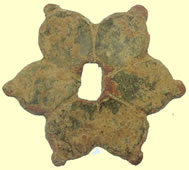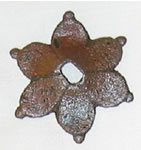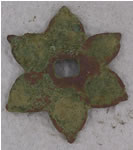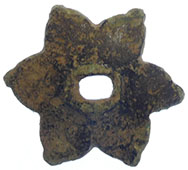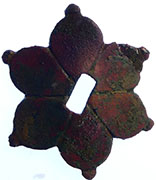

Metal detecting holidays in England with the World's most successful metal detecting club.20 years plus.
Twinned with Midwest Historical Research Society USA.
-
Mounts - flower, petal and Fleu de Lis
Mounts all periods - index to other individual pages
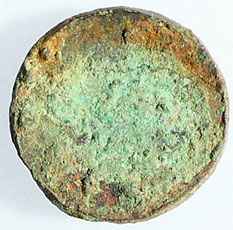
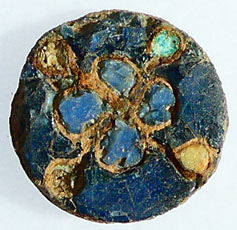
Medieval enamelled mount
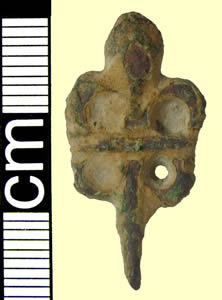
A corroded cast copper-alloy openwork mount in the form of a fleur-de-lis. The lower surface is flat while the upper surface is moulded with bevelled sides. Uppermost are the three fleurs of the lis, with perforations within the side fleurs. The motif rests on a transverse ridge, below which a pair of perforated loops that echo the side fleurs. Central below the ridge is a tapering 'stalk'. There are no obvious means of attachment on the lower surface; it is assumed the mount could be riveted through the holes. The object has corroded leaving a red-brown metal covered in off-white corrosion product; three of the holes have been entirely filled by the latter. No direct parallel has been found for the object; the metal suggests a medieval or, equally, post-medieval date.
Broad period: POST MEDIEVAL
Period from: MEDIEVALPeriod to: POST MEDIEVAL
Date from: Circa AD 1250
Date to: Circa AD 1700
Primary material: Copper alloy
Manufacture method: Cast
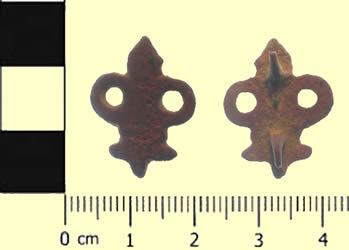
A copper alloy mount in the shape of a stylised Fleur de lys, post Medieval in date, probably from the 16th or 17th century. A central pointed element is flanked by two semi-circular shapes, each with a circular hole through. Two fixing spikes which have been bent over are still in place on the back of the mount. It has a reddish brown patina. It has a length of 21.54mm, width 16.83mm, thickness 1.57mm, weight 1.73g. For reference see SUSS-070486 located on the PAS database.
Chronology
Broad period: POST MEDIEVAL
Period from: POST MEDIEVALDate from: Circa AD 1500
Date to: Circa AD 1700
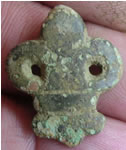
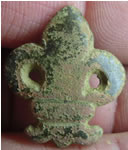
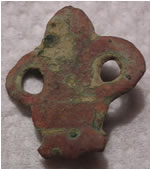
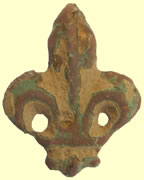
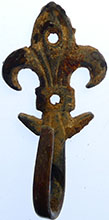
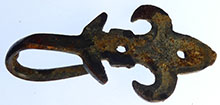
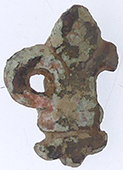
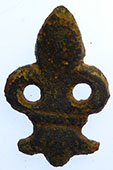
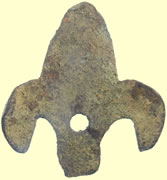
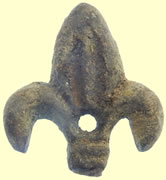

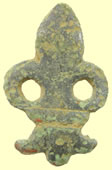
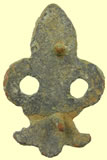
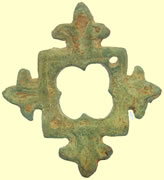
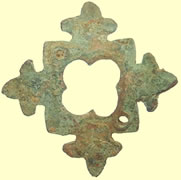
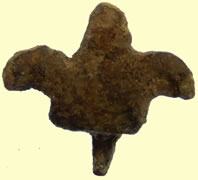
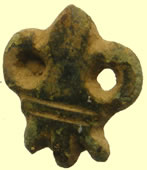


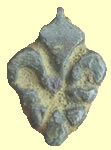
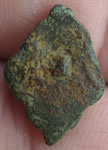
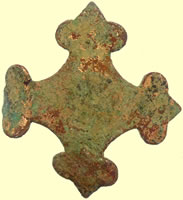
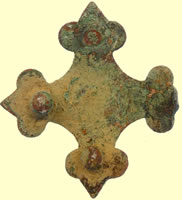


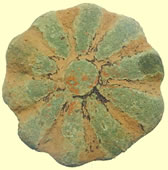
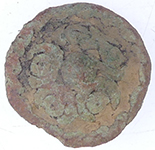
Medieval and post medieval mounts
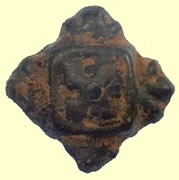
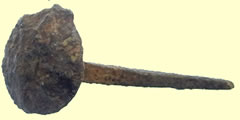
Medieval mount
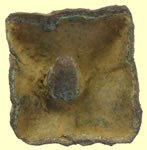
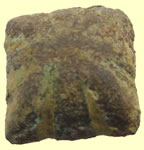
Medieval mount
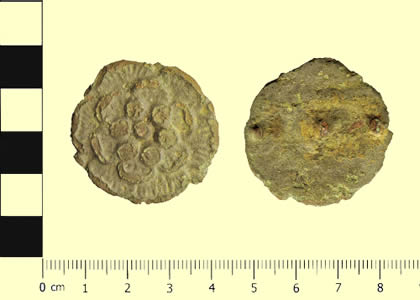
This is a post medieval cast copper alloy circular mount circa 17th century. The form is of a triple layered six petal flower with a central ring of six annulets around a single central annulet. The mount has three fixing points on the back which may indicate that they consisted of a loop and retaining stud.
The surface is heavily corroded and the rim has fritted away around most of its circumference. The surface has a pale mottle green patina.
Chronology
Broad period: POST MEDIEVAL
Date from: Post AD 1600
Date to: Ante AD 1700
Dimensions and weight
Thickness: 2.5 mm
Weight: 13.5 g
Diameter: 35.1 mm
Quantity: 1Materials and construction
Primary material: Copper alloy
Manufacture method: Cast
Decoration style: Floral

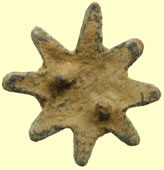
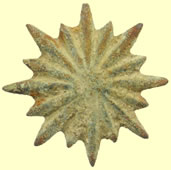
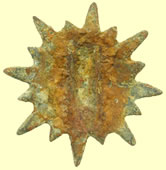


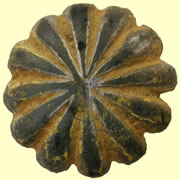
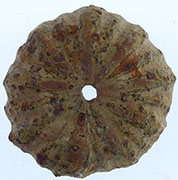


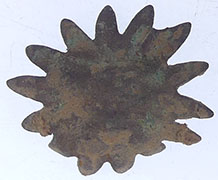
Copper alloy mount of Medieval to early Post Medieval date (c. AD 1400-1550).


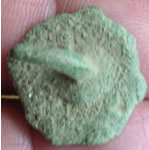
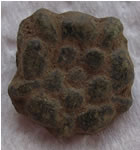

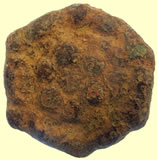





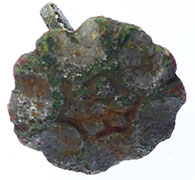
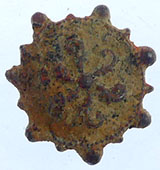
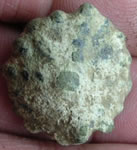
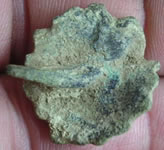


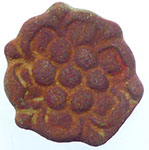


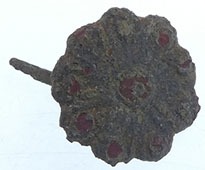
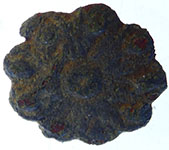




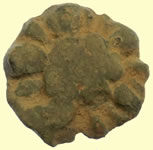
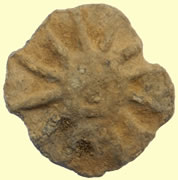

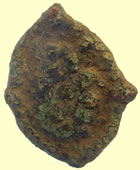
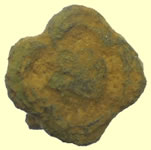




Post Medieval mount, dating to c. 17th century
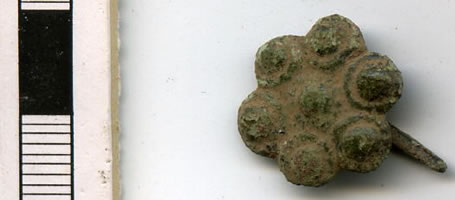
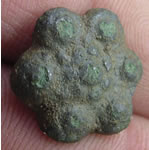
Cast copper alloy mount in the form of a sexfoil, with domed centre and lobes. It has a single complete sharp-pointed lug. Date is uncertain, but it is probably late medieval to post medieval.
Chronology
Broad period: MEDIEVAL
Period from: MEDIEVALPeriod to: POST MEDIEVAL
Date from: AD 1350
Date to: AD 1600
Dimensions and weight
Weight: 2.15 g
Diameter: 17 mm
Quantity: 1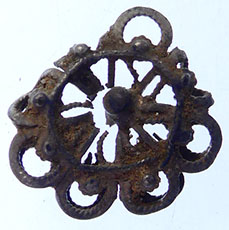

16thC Tudor silver mount - reported as treasure
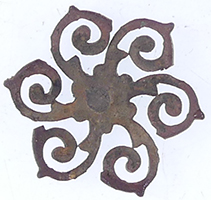
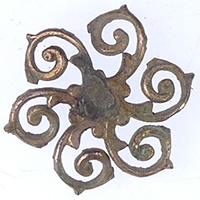
Georgian mount
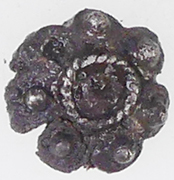
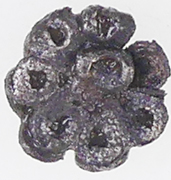
16thC Tudor silver mount - reported as treasure

Copper alloy Post-Medieval mount. Diamond shaped, with fleur-de-lis at each of the four corners. The central section has a raised quatrefoil design within raised curvilinear borders. The reverse is undecorated, with a rivet in the centre.
Chronology
Broad period: POST MEDIEVAL
Period from: POST MEDIEVAL Date from: AD 1500
Date to: AD 1800
Materials and construction
Primary material: Copper alloy
Manufacture method: Cast
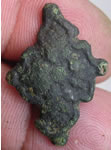
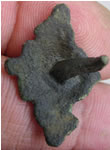
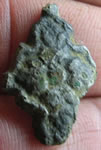
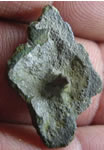


Cast copper alloy Fleur de Lis mount . It has a single pointed lug. Date is uncertain, but it is probably late medieval to post medieval.
Chronology
Broad period: MEDIEVAL
Period from: MEDIEVALPeriod to: POST MEDIEVAL
Date from: AD 1350
Date to: AD 1600
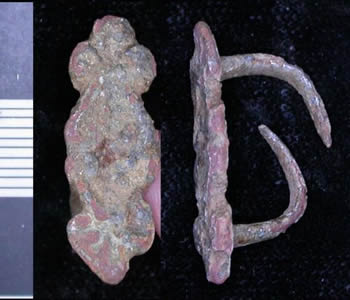


Medieval copper alloy belt mount, 26mm long, 9mm wide and 14mm deep. The object is in fair condition with a reddish patina and weighs 2.71 grams. The object is quite worn and is rectangular in form. It has two semi-circular sectioned shafts, which have been bent over, protruding from its base. The surface is decorated with a trefoil terminal at each end and a central oval section which appears to have foliate decoration.
Chronology
Broad period: MEDIEVAL
Period from: MEDIEVALDate from: AD 1100
Date to: AD 1500
Dimensions and weight
Length: 26 mm
Width: 9 mm
Thickness: 14 mm
Weight: 2.71 g
Quantity: 1Materials and construction
Primary material: Copper alloy
Manufacture method: Cast

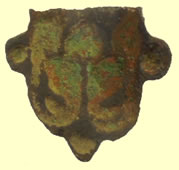
1500 - 1700 mount
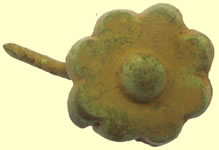




Late 13th to mid-14th century
Medieval copper-alloy sexfoil strap or harness mount, with a central sub-circular dome on the front and a pair of opposing integral rivets or attachment spikes on the reverse. The perimeter edge is steeply bevelled on the front. The reverse is hollow. The rivets are oval in cross-section and taper to blunt tips.










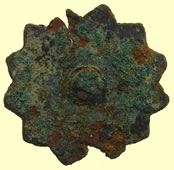
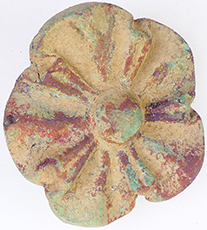


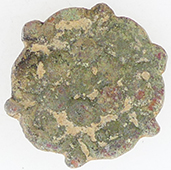

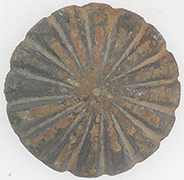
1500-1700 mount




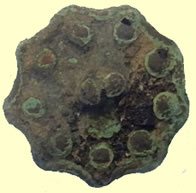


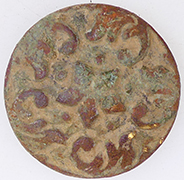
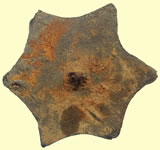






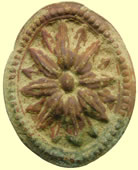


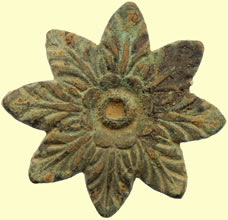
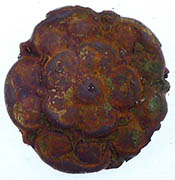
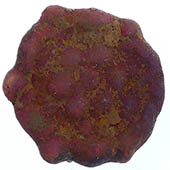


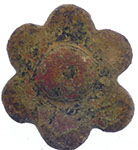


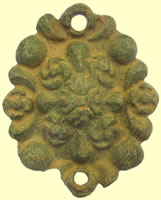

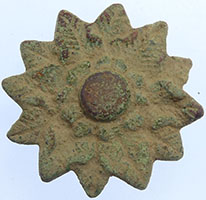
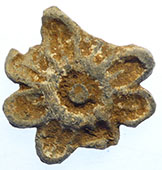




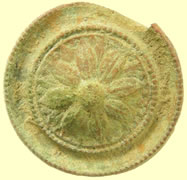

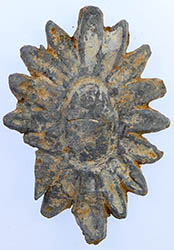


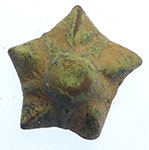




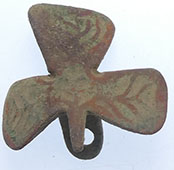

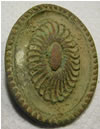


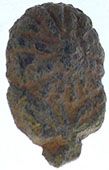
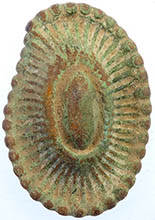

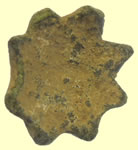
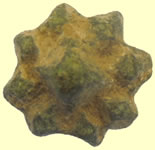
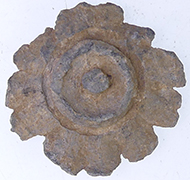





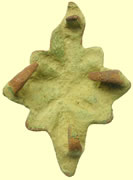






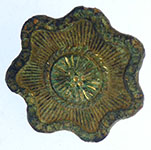


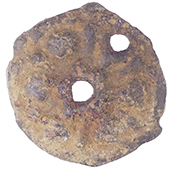
Cast copper alloy sexfoil mount of medieval date (c.1300 – 1500AD). The mount has a domed centre with a rectangular hole through it (6.1mm x 3.5mm) for a separate rivet, now lost. The six lobed petals are raised and arranged in a regular ‘Star of David’ pattern. Each petal has a rounded knop like tip and curved sides. Originally the dome would have been higher but it has been lowered by crushing in the burial environment. The petals are faceted and regular in profile. The rear of the mount is plain and un-decorated. The mount has a mid green polished patina. There is little abrasion although the mount is a little asymmetrical. Egan and Pritchard (1993) illustrate a range of flower mounts made of copper alloy sheet, p.186-194. They are highly variable with 5 to 13 petals. These mounts were in common use by the middle of the 14th century and continued to be popular until the late 15th century.
The mount measures 35.5mm in length, 31.9mm in width, and is a maximum of 4.4mm thick. It weighs 5.04 grams
Broad period: MEDIEVAL
Period from: MEDIEVAL Date from: Circa AD 1300
Date to: Circa AD 1500

